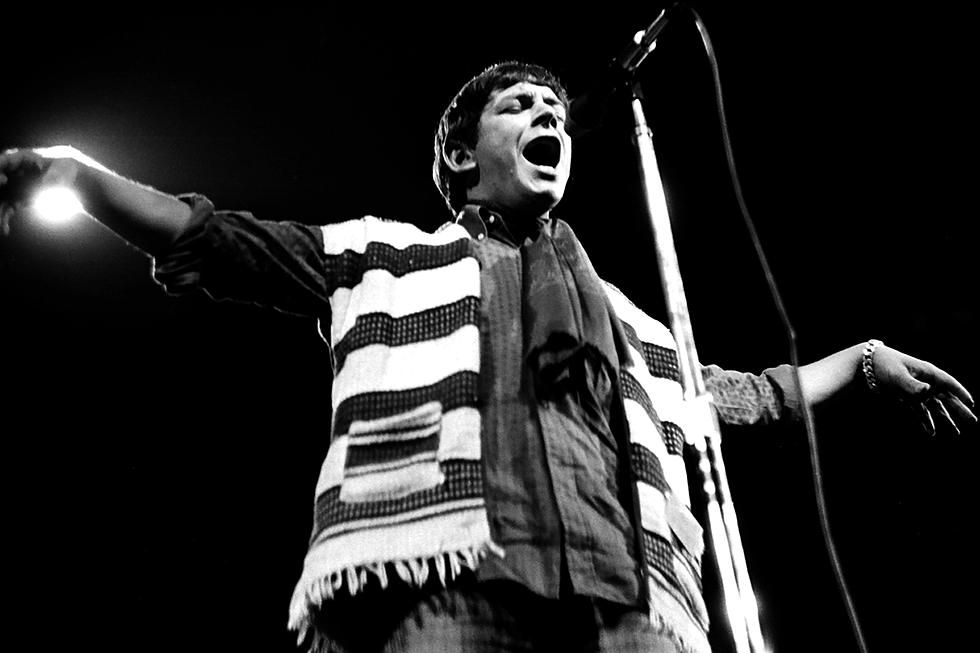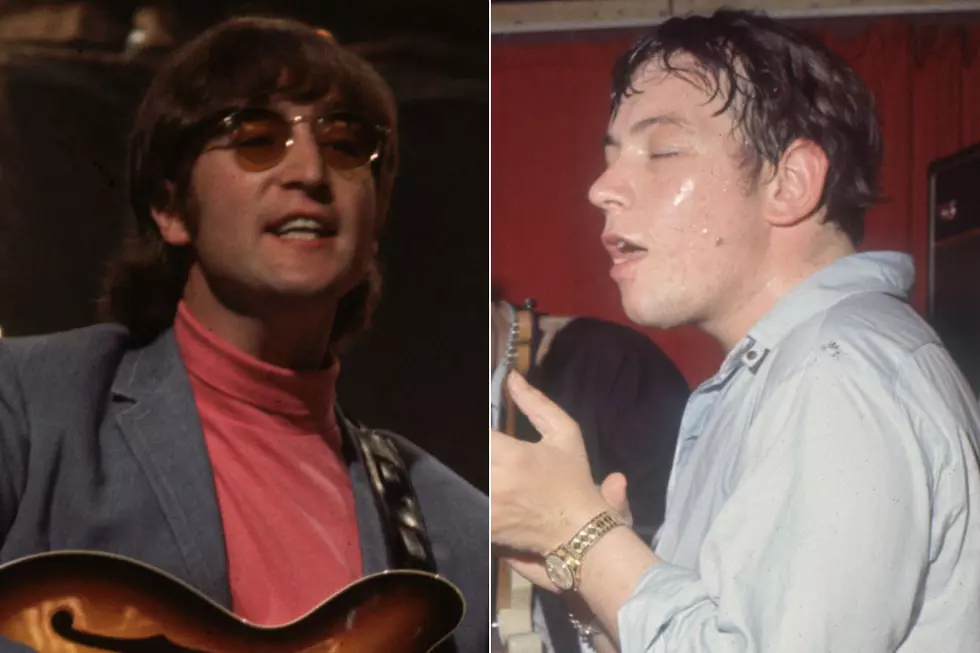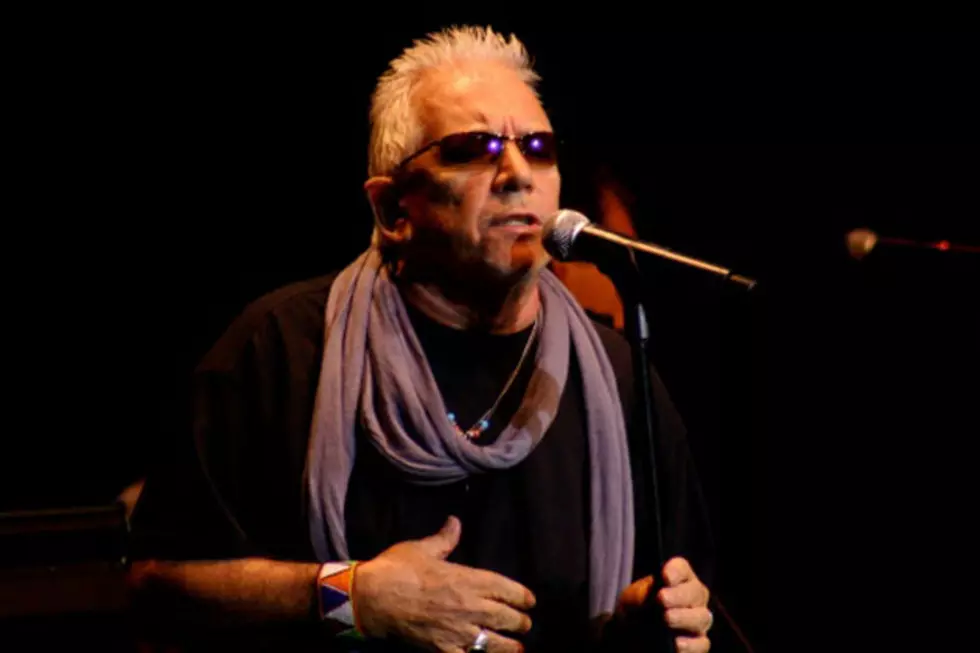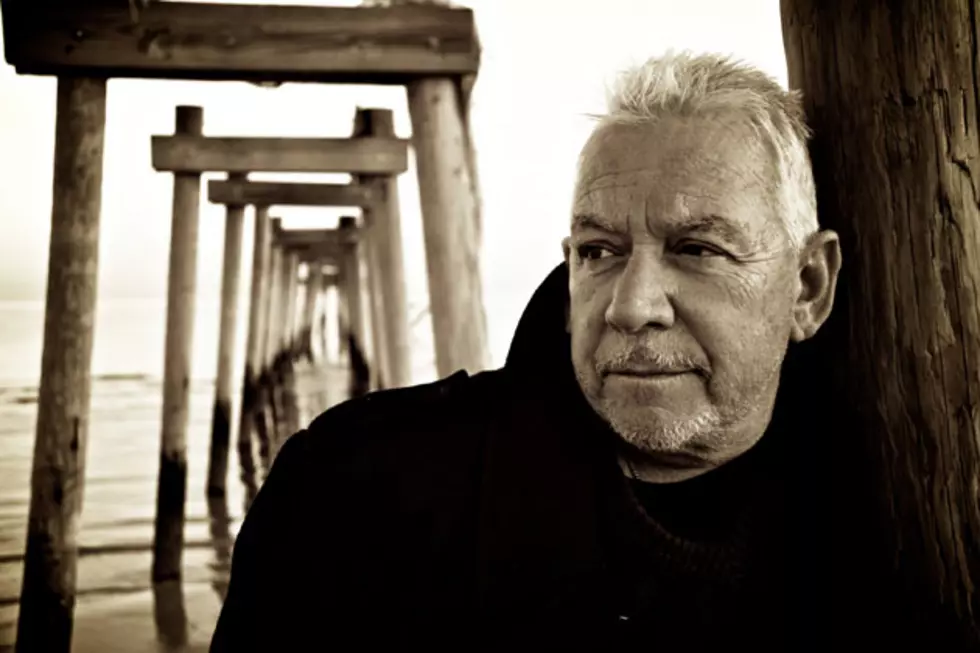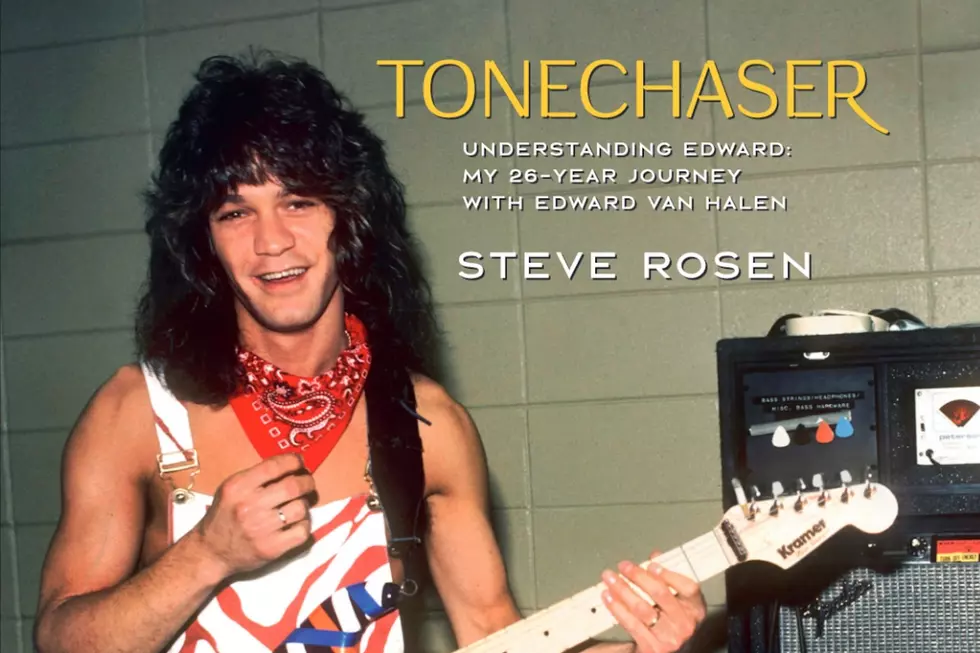
Eric Burdon Talks Animals, Water, War, Life, Death and Rock & Roll!
It's been 50 years since we first heard the Animals coming out of our radios with their haunting rendition of the folk standard 'The House Of The Rising Sun.' Singer Eric Burdon has been making music ever since and has just released a brand new album, 'Til Your River Runs Dry.' The album has many of the Burdon trademarks as he continues on a journey started all those years ago. The album sounds like vintage Eric, yet totally contemporary at the same time. We chatted with Mr. Burdon about his past, present and future.
How are you doing Eric?
I'm doing good!
Congratulations on the new record!
Well thank you!
It sounds vintage, but totally 2013 at the same time.
Well that's good, I'm glad you say that.
Your vocals still sounds incredible. Have you ever had any issues with your voice over the years?
Not really...a girlfriend of mine in London, who was also a well-known singer, Maggie Bell -- she used to be with a band, Stone The Crows. She once said to me in her motherly, Scottish way (with Eric affecting a thick Scottish accent), "Eric, don't ever worry about losing your voice. If you lose your voice and it goes all crackity crickity, just think about Louis Armstrong and the way he used to sing." And that was great advice.
The album covers a lot of ground-religion, politics, the environment...did you try and tie all the songs together in a kind of song cycle, or did it all just come out naturally that way?
Well, it comes out that way, but it's just the way I feel. When I look at the play list of the new songs I want to do on an album, I think, how the hell are these songs gonna glue together? But then, it's the voice that does it. It's the spoken word and singing voice that is the glue that brings them together.
Have you been working on these songs for a while?
Well, for instance, the basis for 'Water' goes back like three or four years. I was doing a TV show over in Germany. We were in the Volkswagen building, and they have a great restaurant there, and there were some luminaries in the restaurant and we were invited to join 'em for drinks. Then I found out it was Mikhail Gorbachev I was sitting next to. Looking at this guy and realizing I'm sitting next to one of the guys who changed the modern world, and I'm thinking what can I ask him that would be important...something that I don't know about. So I said, through an interpreter, "What do you feel is the next major problem that the world is gonna face?" And he said, "Water." And I thought, if I could speak Russian and talk to him now, I'd be saying, "Well, how can I join ya? How can I help ya? What can I do to make this a known reality?" To get people to understand what a guy like you is putting your full political force now into water awareness.
I love the line, "This world is not for me / I'll make a new one wait and see."
Yeah, well I've felt that ways since I was a kid, on different levels. It's like, why couldn't my elders understand that me going to the cinema wasn't just like playing hooky from school, I was educating myself. So that kind of ties in to that song, the rebel song, 'Old Habits Die Hard.' I tried to put myself into the mind of people I knew in Paris in '68, who were on the barricades going against the vicious police and all that. I fell in love with that kind of romantic rebel. And then recently with the Occupy movement in the Middle East and what happened in North Africa and Egypt. You may know in your heart of hearts that they're losers and they're not gonna win, but hell, who cares? It's the doing that counts.
You're able to summon up that youthfulness in the delivery of the song.
Yeah, in fact in a sense it's not me, it's me playing a part. If I was to make a video of that for instance, I wouldn't use myself, I'd use a 16-year old kid. That's the image that I see.
And what about the song 'Memorial Day?'
Well I was in London a few years ago, in Hyde Park. It was heartwarming to see that Brits have extended their war memorial, which they take very seriously. It's a very big day in England, as well as it is in the United States. In England they've gone out of their way to make a war memorial to the animals that helped in the world wars...dogs, birds, messenger pigeons, horses, you know. And it's like, I said to myself wow, this is really cool and what started me thinking about recording a song was like, "Well, who are you gonna remember on Memorial Day?"
You know, we're not all fathers and mothers and husbands and wives of people who are in the armed forces. There's a lot of 'em and God bless 'em for what they do in service. There's also the poets and the artists, and in fact if you look into British history -- the history that I grew up with -- we had a lot of great poets that were in the worst battles in World War I, where 60,000 or 100,000 men were slaughtered in one battle, and these guys made it through and they were educated like Oxford grads. And they became the poets of the day, so I say the hippies, the poets AND the Spartans...ultimately soldiers in war, they want peace...unless they're crazy. They all want it to be over and be back home.
What do you think of the last ten years or so, with America dragging around these wars?
Silly...SILLY...STUPID! There are ways of doing things, and to go to war for vengeance is the worst reason, that's the worst reason you can go to war. We shouldn't go to war unless we're attacked, okay, and we're at 9/11...they attacked us. There were soldiers in the armed forces who realized that we could take the countries that we believed were our enemies. We weren't sure...nobody was sure of anything. But you know, smaller, tighter groups of soldiers is what I think is what's called for. You don't send battalions of boots on the ground. It can be done. It first started in WWII with Britain's Special Air Services, where guys would go behind the lines in jeeps and American Chevy trucks and take out the enemy airfields underground in the dark of night, but unfortunately America was lacking in intelligence in terms of the Middle East. We had to rebuild our intelligence, we were sadly lacking. That's something that we've caught up on it. We had to restart. It became a world of terror and we still haven't come down from it.
It also seems like, because it's not televised the way, say, Vietnam was, there's almost a blank look on people, like they forget it's even going on.
If we didn't learn from Vietnam...God save us! Okay, generals and officers can complain about renegade reporters, but there's something to be said for that. And the whole thing about when we got the 'embedded concept' I thought, "Oh God, here we go...all we're gonna get is 'glory glory glory' when we know that's not the truth."
Well...back to the music (both laugh)...How did you get hooked up with the Greenhornes to record that recent EP?
Well, they called me and asked me. They did a radio show with me at SXSW. Somebody told me I'd enjoy playing with these guys cause they hold the Animals catalog in some reverence. I was amazed at the fact that they played Animals songs note for note, exactly, but with a different feeling. It was really refreshing for me.
And you are working on a biography as well?
It's a biography of the times, you know, that I lived. I hate to go back to talking about warfare, but it's about growing up, you know, 1941 the year I was born, they bombed the hospital! So, that's a starting point!
2013 marks the 50th anniversary of the Animals. Are there any special events or releases planned to commemorate?
There may be later on, some kind of anthology or something. But, um, the Animals is a bit of a sore point at the moment. I lost a lawsuit in England -- well, it's ongoing -- a fight over the name. It happens to a lot of people, and it's happened to me.
Oh wow, that's too bad.
(laughing) Yeah, it is too bad! In a way...but, it's good for me to be able to leave it behind and put it in perspective. Good memories!
The Animals were an incredible band. Your combination of blues, jazz and soul made you guys stand out from most of the other bands of the time.
Well yeah, that's my point of view! But I came to America, to California, for my health. That's why I came here, but the other guys stayed in the U.K. and that's what split us down the middle. Chas (Chandler) went on to manage Jimi Hendrix. He saw the great way out and was very successful doing that. I'm in touch with Hilton [Valentine, the guitarist] now and again. But you know...no we've kind of drifted apart. Tough relationship.
What did you think the first time you saw Hendrix play?
First time I met him was really early on when the Animals were in New York, on the same bill as Little Richard and he was playing for Little Richard. Someone told me years later, you know that little black kid who was in the elevator...that was Jimi Hendrix! But when he came to London, it was Django unleashed in reality. He was a very interesting young man. He had a great vision of the world...a great attitude, but unfortunately the big money game came into play and he got twisted out of shape, unfortunately.
How old were you when you first started playing the club circuit?
Well, in my hometown I persuade my father to go with me to the jazz club I used to go to 'cause he found out that's where I'd been hanging out instead of doing my homework. I introduced him to all the guys, all the girls in this club. He loved the music and that was great to see him take to traditional New Orleans jazz. I made a bargain with him, he said "OK, don't tell your mom. We'll keep it quiet, as long as you get your schoolwork done." And that was the big bridge I had to cross in order to get my own people on my side, have them understand that I was serious about this form of expression. When the day came for us to be in the recording studio and have records issued, my grandfather, who was really a horse man, he was a gambler and knew everything about the horses, the jockeys, the trainers and all that stuff. He switched to following the New Musical Express, and watched what's going up the charts.
Who would you say was your biggest inspiration when you were starting out?
Well I worshiped Chuck Berry! And then we ended up on tour with him! I actually got past Chuck Berry, the guitar player hero, and we had lunch together one day and he very kindly said to me, "Listen, always keep a couple dollars in your wallet, but keep your real wad in your sock. Don't do drugs and drink! Don't let them do to you what hey did to me." And I said "Yes sir. Great advice." Of course I didn't take any notice (laughing) but it was nice of him to say that.
I always loved the 'Winds Of Change' album, it's just got such a unique sound. Do you have any remembrances of making that record?
Oh yeah...I remember it well.
The song 'The Black Plague' is so unlike anything, even today.
Oh god (laughing), we had so much fun in the studio doing those recordings. You know back then, the record companies were like throwing stuff at ya like "Do some more...stay in the studio longer...do whatever you want." Not like today, although we've kind of passed that now with the attitude of bands wanting to be independent. We've passed that point of record promotion people standing over you telling you what to do.
But back then, that was the first wave of that. It was a joy to be living in L.A., which at the time was the center of rock, you know, L.A. was the place to be back then. It was so dream like, living in Laurel Canyon especially was a dream space to be in. Everybody in that canyon was involved in music. My next door neighbors were like Canned Heat, John Mayall living around the corner. And when we were up there in the canyon, we never saw a cop ever, and down below you were like pursued by the LAPD for anything and everything, just walking on the street you'd get pulled over you know. But I found out why they weren't up there, their radios wouldn't reach up there.
I've always loved the story of songwriter Barry Mann, who, when he heard the Animals were releasing 'We Gotta Get Outta This Place', tried to get the record company to stop it because he wanted his version of it out. When you first heard his demo, what hit you about it?
My opinion was, they wrote it for the Animals. I mean, it was coming out of the Brill Building. What did the Brill Building comprise of? Writers writing for other artists and um, they took it real personal, they got really pissed off. I was sitting next to his wife (and songwriting partner Cynthia Weil) in a doctor's office one day, and she turned around to me and said, 'you know Barry and I hated what you did those songs,' as she stood up and walked into the office, she turned around and said, 'but we got used to it.'
I'm sure that the royalty checks didn't hurt!
Yeah, right! But all of this singer songwriter thing to me is so much bull. If you hear a good song and you want to sing it, you're gonna sing it. And you should have every right to, that's why people write songs in the first place.
And as a songwriter, you'd be glad that someone took your idea and ran with it and made it something you hadn't envisioned.
Exactly! It's the fish that swims both ways, up the river and down the river.
Congratulations again on the new record. I think we're all glad to have you back doing what you do best.
Well thank you for the kind words! Don't be a stranger!
Thanks to Eric Burdon for his time and memories. He is one class act!
More From Ultimate Classic Rock
